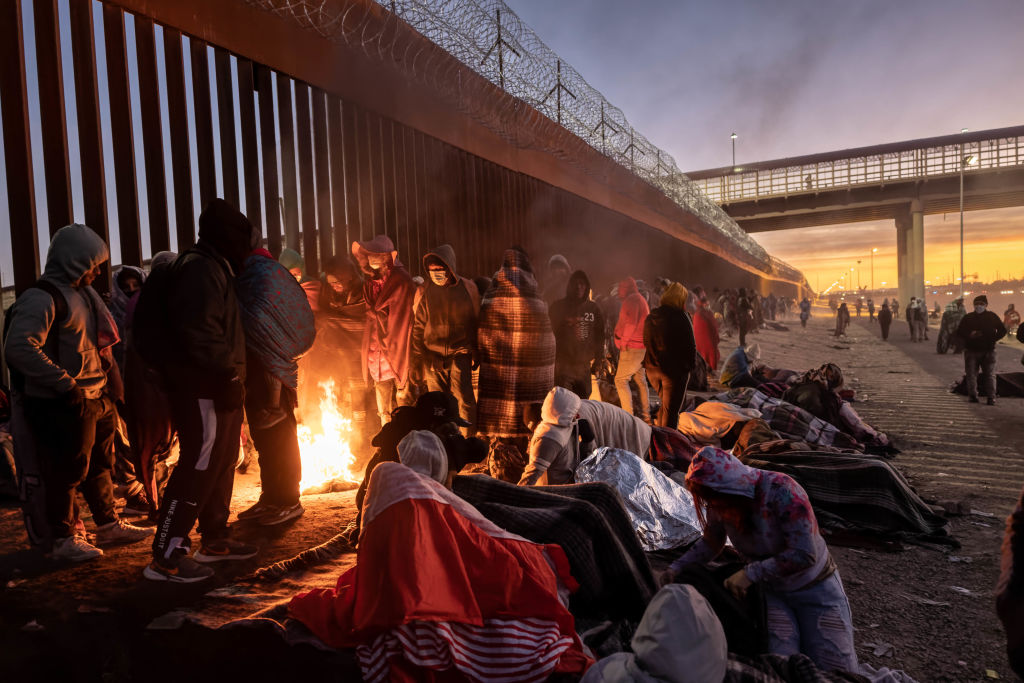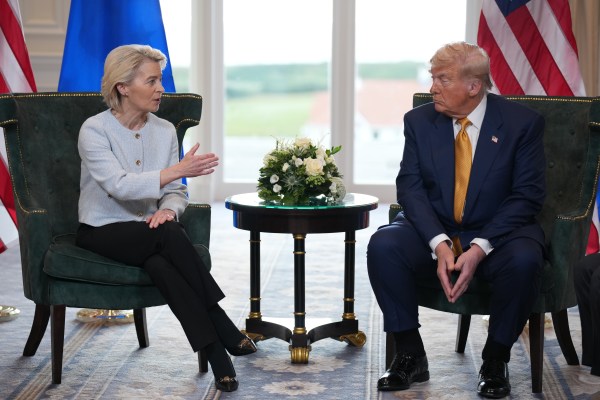Happy Tuesday! We hope you had a wonderful holiday weekend—and that you haven’t had to go outside since Thursday. The wind chill in Chicago is supposed to get back into double digits for a few hours later today!
Quick Hits: Today’s Top Stories
- President Joe Biden on Friday signed into law the National Defense Authorization Act for Fiscal Year 2023 and a continuing resolution funding the federal government through December 30. The House voted 225-201 Friday to approve a $1.7 trillion omnibus package funding the government on a longer-term basis, but the 4,000-page legislation must go through a lengthy enrollment process before it reaches Biden’s desk. The president is expected to sign the larger package into law once that process is complete, likely in the next few days.
- Chinese public health officials estimate a quarter of a billion people—18 percent of the country’s population—were infected with COVID-19 between December 1 and December 20, according to a Wednesday Chinese Center for Disease Control briefing leaked to the Financial Times over the weekend. As China continues to dismantle its COVID-Zero policies, the country’s National Health Commission said Sunday it would stop publishing daily COVID-19 case numbers and said Monday it would end mandatory eight-day quarantines for inbound travelers beginning January 8.
- Days after banning women from enrolling in universities, the Taliban on Saturday prohibited women from attending religious classes at mosques in Kabul and ordered all foreign and domestic non-governmental organizations to cut ties with any female employees—reportedly because some employees were not wearing their headscarves correctly. Four NGOs—Save the Children, the International Rescue Committee, the Norwegian Refugee Council, CARE—have already suspended operations in Afghanistan in response to the move, and Taliban officials turned water cannons on women protesting the decision this weekend.
- Taiwan’s defense ministry said Monday that China sent 71 planes and seven ships toward the self-governing island over the weekend, with at least 47 entering its air defense identification zone. The aggression is almost assuredly a response to President Biden on Friday signing the NDAA into law, codifying some U.S. security assistance to—and cooperation with—Taiwan. This weekend’s exercises were the largest such display of force from the People’s Liberation Army since the aftermath of Speaker Nancy Pelosi’s visit to Taipei in August.
- U.S. Africa Command announced Friday that—at the request of the Somalian government—U.S. forces conducted a “self-defense” airstrike near the coastal Somali city of Cadale, killing six members of the al-Shabaab terrorist group. The strike was the third of its kind this month, and U.S. officials claimed no civilians were injured or killed.
- The Federal Reserve’s preferred measure of inflation, the personal consumption expenditures (PCE) price index, increased 5.5 percent year-over-year in November, the Bureau of Economic Analysis reported Friday—down from a 6.1 percent annual rate one month earlier. Even after stripping out more volatile food and energy prices, core PCE increased at a 4.7 percent annual rate in May, well above the Fed’s 2 percent target. Consumer spending, meanwhile, increased just 0.1 percent last month after increasing an average of 0.75 percent in September and October.
- Erie and Niagara county officials confirmed Monday at least 28 people have died in western New York in recent days after a devastating winter storm swept through the area, bringing freezing temperatures and nearly 50 inches of snow. President Joe Biden approved an emergency declaration for the state, and the Buffalo Niagara International Airport will remain closed through at least Wednesday morning. About 30 additional people have reportedly died elsewhere in the United States due to this week’s harsh blizzards.
- The Food and Drug Administration released a memo on Friday announcing it would overhaul packaging labels on Plan B, the emergency birth control pill, to make clear the contraceptive is not an abortifacient. “Plan B One-Step will not work if a person is already pregnant, meaning it will not affect an existing pregnancy,” the FDA said. “Evidence does not support that the drug affects implantation or maintenance of a pregnancy after implantation, therefore it does not terminate a pregnancy.” Pro-life groups disputed the change, accusing the agency of ignoring science to protect access to the drugs as some states crack down on access to abortifacients.
- Maricopa County Superior Court Judge Peter Thompson issued a ruling on Saturday rejecting efforts by Arizona’s Republican gubernatorial nominee Kari Lake to overturn Democrat Katie Hobbs’ victory last month. Lake, Thompson ruled, “failed to provide enough evidence” to support her claims that printer malfunctions in Maricopa County were intentional and/or meaningfully affected the outcome of the race. “The Court cannot accept speculation or conjecture in place of clear and convincing evidence,” Thompson wrote.
- According to a court filing made public last week, Meta, Facebook’s parent company, has agreed to pay $725 million to settle a class-action lawsuit that alleged Facebook allowed Cambridge Analytica and other third-party groups to access private user data six years ago. The settlement—which does not require Meta to admit to any wrongdoing—still requires final approval from a federal court in the northern district of California.
Title 42 in Limbo

On Christmas Eve, while many Americans were bundling the kids in coats and braving the snow to head to candlelit church services, three buses pulled up outside Vice President Kamala Harris’ home in Washington, D.C., and dropped off more than 100 migrants transported from Texas. Migrant aid groups and church volunteers fed them coffee and tamales, played Christmas carols in Spanish, and helped many reach friends or family in the United States.
The existence of Title 42—a pandemic-era policy that allows border officials to quickly expel migrants without allowing asylum applications otherwise required by law—hasn’t stopped the flow of people trying to enter the country. And as we discussed a few months ago, in the absence of substantive immigration action from Congress, some border states have resorted to chartering buses to take migrants north, while the fight over immigration policy has focused on whether to keep or ditch Title 42. A federal judge ordered the Biden administration to end Title 42 by December 21, but days before its scheduled expiration Supreme Court Chief Justice John Roberts paused its end pending further review, leaving migrants and border officials in limbo.
Activated in March 2020 purportedly to prevent the spread of COVID-19, Title 42 has in the nearly three years since been used less as a public health tool than as a means for managing—and unintentionally increasing—migrant flows. Border officials have completed more than 2.5 million expulsions under Title 42. Because Title 42 expulsions don’t include the threat of deportation and other legal consequences, many solo adult migrants began crossing repeatedly, trying again each time border officials caught and ejected them—inflating the border encounter statistics.
Reluctant to overwhelm its own shelters and fuel the kidnapping and trafficking of migrants, Mexico has nevertheless agreed to accept expulsions of migrants from countries including Honduras, El Salvador, and Mexico—while sharply limiting expulsions of migrants from many countries it can’t easily deport them back to—so Title 42 is disproportionately used on those migrants. In October, Mexico began accepting more Title 42 expulsions of Venezuelan migrants after the U.S. created a legal entry pathway with rules disincentivizing Venezuelan migrants from passing through Panama and Mexico to cross illegally. A federal court in March banned the administration from expelling families back to countries where they could face persecution, and Title 42 is mostly used on single adults—families and unaccompanied minors account for only about 12 percent of expulsions.
Title 42’s basis in public health has served to highlight hypocrisy on both sides of the aisle. Though making frequent use of Title 42 at the border, the Biden administration has pushed in court for its end, arguing the public health use has expired—while relying on the pandemic to justify extending student loan repayment pauses and push for loan forgiveness. Similarly, Republican-led states that have long abandoned other COVID-19 safety restrictions are leading the legal fight to keep Title 42 intact.
But in recent months, Title 42 has become less impactful thanks to the shifting composition of migrant flows. Migrants are increasingly coming from Cuba, Nicaragua, and other countries where the U.S. has fewer expulsion and deportation options because the countries in question don’t cooperate. “[Those] people are, for the most part, being processed in the United States and released,” David Bier, associate director of immigration studies at the Cato Institute, told The Dispatch. “So there has been both a major increase in repeat crossings, but also this really sustained increase in people from countries that they can’t use Title 42 on.”
This combination of Title 42-driven recidivism and increasing flow produced a record 233,740 migrant apprehensions at the southwest border in November, Customs and Border Protection reported last week, up 1 percent from October. Of those, 204,000 were unique encounters, up 4 percent from October and nearly double last November’s tally. Meanwhile, only 30 percent of those people are from Mexico and northern Central America—down 14 percent year-over-year—while people from Cuba or Nicaragua accounted for 35 percent of the unique encounters.
Some analysts—and the Biden administration—argue ending Title 42 and returning to more formal deportations will bring down crossing attempts in the long run. “Today a single adult from Honduras who crosses the border is almost certainly going to be sent right back to Mexico,” Aaron Reichlin-Melnick, Policy Director at the American Immigration Council, told The Dispatch. “Because they’re already at the border, they’re already thousands of miles away from home, their biggest incentive is going to be to try again—and keep trying until they run out of money. But if the U.S. government takes that person and deports them all the way back to Honduras, then it’s another 2000-mile journey to make it all the way back to the U.S.-Mexico border for a second try.”
But officials still expect a surge of attempted crossings when Title 42 ends. “As with every time the U.S. government changes policies, smugglers sell the message that now is the time to come,” Reichlin-Melnick said. The increase—combined with the higher paperwork burden of processing asylum claims and deportations—could produce bottlenecks in detainment facilities and border towns.
While in limbo awaiting the Supreme Court’s ruling on when and whether Title 42 will end, officials and border towns are bracing for impact. U.S. Customs and Border Patrol has 23,000 officers working the southern border, and hundreds of National Guard soldiers and law enforcement officers have been sent to help with processing and enforcement: setting up extra detainment tents, stringing barbed wire, and patrolling in Humvees. Meanwhile, thousands of migrants have gathered across the Rio Grande River from several major crossings. Democratic El Paso Mayor Oscar Leeser declared a state of emergency to expand shelter capacity, and the city opened its convention center as extra housing while some migrants camped on sidewalks.
Many migrants gathered across the border are waiting to see what happens with Title 42, but analysts warn they won’t wait forever. “If those rules don’t change, then at some point they’re just going to come,” Bier said. “People can’t just put their lives on hold forever.”
And though Republican Sen. Mike Lee forced the Senate to vote on an omnibus amendment that would have kept Title 42 in place, the measure failed and Congress included no substantive immigration reform in its year-end mega-bill. It did provide the Border Patrol with a 17 percent funding boost and included money for the Department of Justice to develop electronic case management for immigration courts—but offered only a third of the funding Biden requested to speed up asylum claims processing.
Meanwhile, Reichlin-Melnick argues legal and congressional efforts to keep Title 42 in place are merely distracting from the bigger problems of sluggish processing and increasing migrant flows. “Ending Title 42 is like ripping off a band-aid,” he said. “Sure, you could keep that band aid on while the wound festers and gets worse. But you’re fooling yourself if you think the fact that you can’t see the wound get worse means it’s not getting worse.”
Worth Your Time
- Attention aspiring authors: A book about the history of the Midwest will always merit a mention in TMD—and John Bicknell’s review of Jon Lauck’s The Good Country has us wanting to run out and buy a copy. “The demise of regionalism, the decline of agriculture as an economic engine, and the rise of mass culture, along with the accompanying concentration of economic and media dominance on the coasts surely played as large a part in the continuing view of the Midwest as ‘flyover country,’ a term of utter contempt that needs to be tossed on the ash heap of history,” Bicknell writes in Law & Liberty. “It is time, says Lauck, for a reconsideration. ‘Surely we can recognize the neglect of the old Midwest and see its virtues and also research and recognize those who were once not a prominent part of the midwestern story, thereby bringing some symmetry and proportionality to the whole affair, avoiding either/or history and round upon round of denunciations and reprisals, and simply work hard to imagine and capture the full story of the region,’ he writes.”
- And speaking of the Midwest, GOP Sen. Todd Young of Indiana recently sat down with Semafor’s Joseph Zeballos-Roig to talk about the resurgence of bipartisanship in the Congress that’s coming to a close next week. “Working across the aisle helped Republicans keep the filibuster alive in a 50-50 Senate by giving Joe Manchin, D-W.V. and Kyrsten Sinema, I-Ariz. wins they could point to while under pressure from their Democratic colleagues to junk it,” Zeballos-Roig noted after his conversation with Young. “[But] the fact that some old ideological lines between the parties have begun to blur also may have opened up space for cooperation. Young is at the vanguard of Republicans willing to toss out GOP orthodoxy against federal intervention in most industries if it means safeguarding national security and competing against China’s rising influence. Partnering up with Senate Majority Leader Chuck Schumer, Young pushed the $280 billion CHIPS and Science Act over the finish line this summer. The bill poured money into subsidizing U.S. semiconductor manufacturing and authorized funding for bleeding-edge tech research. ‘We at the federal level of government can’t just ignore these things and crack open Adam Smith as an A-to-Z manual on what to do,’ Young said, referring to the Scottish economist many consider the godfather of free-market philosophy. ‘We need to respect the power of markets but also ensure that our markets can work when tested.’”
Presented Without Comment
Also Presented Without Comment
Also Also Presented Without Comment
Toeing the Company Line
- In the latest edition of Stirewaltisms (🔒), Chris reflects on the importance of good citizenship in a political era increasingly driven by the extremes. “We plant trees the shade from which we will never enjoy, but do so for posterity, because we wish to leave a legacy of freedom, self-determination, and peace to the generations that come after us,” he writes. “Some day, this American empire of liberty will end. But not today, so we are obliged to build and work as if it would last forever.”
- With the omnibus spending bill heading to President Biden’s desk, Haley devoted Friday’s Uphill (🔒) to some of the legislation’s key provisions, from Ukraine aid and Electoral Count Act reform to disaster relief and TikTok bans.
- Nick’s latest edition of Boiling Frogs (🔒) dives into the “strange idiocy” with which China is handling COVID-19. “The Chinese Communist Party’s COVID policy makes no sense,” he argues. “It hasn’t made sense in awhile but it makes less sense now that they’ve completely reversed themselves without warning or, seemingly, preparation.”
- In Friday’s G-File, Jonah laments our elected officials’ preference for complaining over problem solving. “I hate [omnibus spending bills] and I agree with nearly everyone who complains about them,” he writes. “Go ahead and vote no on this monster. But if all that does is mean having to vote on a similar monster in 2023, what’s the point other than virtue signaling?”
- Christmas, David writes in Sunday’s French Press, is the most humbling holiday on the calendar. “Acknowledging the limits of our understanding requires us to embrace humility, recognize that we often find the truth in the most unlikely of places, and admit that even our most firm convictions can be firmly wrong,” he writes. “Christmas reminds me of those commitments.”
- In this week’s Wanderland (🔒), Kevin offers up some thoughts on both Christmas and fatherhood. “It took an incarnation to show us, Homo allegedly sapiens, that man can be more than meat, that we might discover in Bethlehem the almost imperceptible shifting and struggle of a fallen world trying to get to its feet,” he writes. “But on that long uneasy night, the power and the glory and the kingdom were far away, years and miles away, and if there were any immortal diamonds to be had, the wise men weren’t saying much about them. Nobody at the beginning knows how the story is going to end. They only know what they know: mother and father and newborn child.”
- Declan was joined by economist Desmond Lachman on yesterday’s Dispatch Podcast for a conversation about the Federal Reserve’s latest moves and what they portend for 2023. Are central bankers fighting the last war? Is a recession inevitable?
- From Peter Meilaender’s exorcism of his inner Scrooge, to Will Collier’s historical look at the Rankin-Bass Christmas specials, to Oliver Rhodes’ review of the new Harry & Meghan documentary, the website was bustling with activity over the long holiday weekend. Be sure to check it out!
Let Us Know
Get anything good for Christmas or Hanukkah this year? Give anything particularly good to somebody else?






Please note that we at The Dispatch hold ourselves, our work, and our commenters to a higher standard than other places on the internet. We welcome comments that foster genuine debate or discussion—including comments critical of us or our work—but responses that include ad hominem attacks on fellow Dispatch members or are intended to stoke fear and anger may be moderated.
With your membership, you only have the ability to comment on The Morning Dispatch articles. Consider upgrading to join the conversation everywhere.